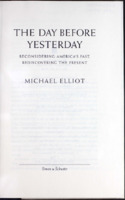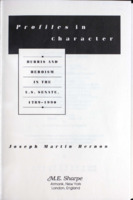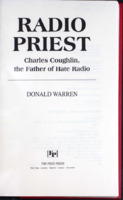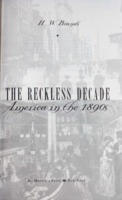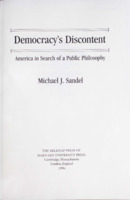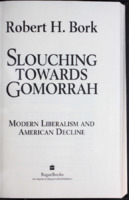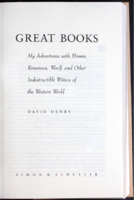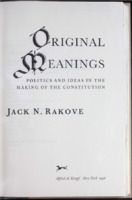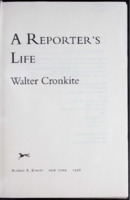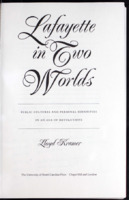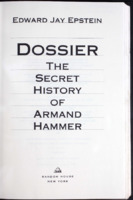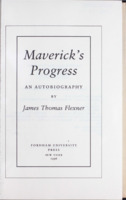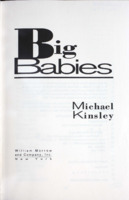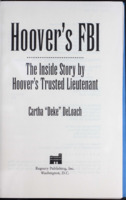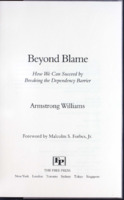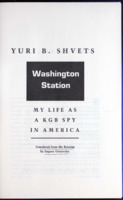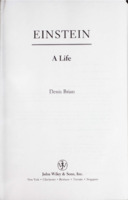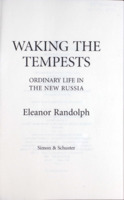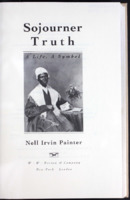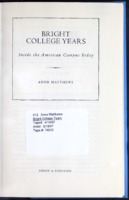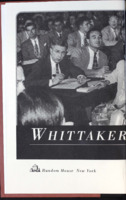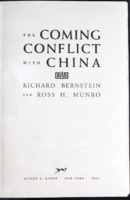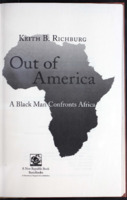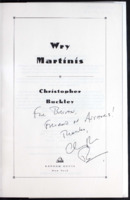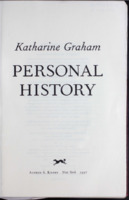Search
540 items
-
The day before yesterday : reconsidering America's past, rediscovering the present
Michael Elliott's survey and commentary on the the United States since World War Two. -
Profiles in character : hubris and heroism in the U.S. Senate, 1789-1990
Taking the position that some of the lesser-known or unknown U.S. senators deserve renown more than some of the better-known ones, each chronological chapter contrasts the lives of two senators. Included are: Rufus King, James Monroe, Thomas Hart Benton, John C. Calhoun, William Pitt Fessenden, Charles Sumner, George Frisbie Hoar, John Sherman, Henry Cabot Lodge, Thomas J. Walsh, William E. Borah, George W. Norris, Robert A. Taft, Arthur H. Vandenberg, Hubert H. Humphrey, and Strom Thurmond. -
Radio priest : Charles Coughlin, the father of hate radio
Warren Donald's biography of Father Charles Coughlin. -
The reckless decade : America in the 1890s
A period every bit as turbulent as our own age, the 1890s saw vast changes in the economy, politics, and society of the United States, while giving birth to a technological revolution that would profoundly alter the lives of all Americans. Those who knew how to exploit this new world - Carnegie, Morgan, Rockefeller - prospered handsomely; those who did not became icons of how the other half lives. The chilling violence of the Homestead steelworkers' strike and other labor conflicts underscored the tension that such disparity produced. The economic elite ensured that the currency of capital would remain gold and not free silver, yet technology transformed everyday life as alternating current began to light the nation. That new frontier came just when the Western one on which America prided itself closed. No longer could America expand internally; imperialism was the way of the future. But even as the United States became a colonial power, Jim Crow laws ensured that only whites could reap the harvest of empire. In The Reckless Decade, Brands captures the essence - whimsical, tragic, and intrinsically contradictory - of the 1890s, when for the first time America turned its face outward to the world and geared up for the "American Century." Evocative and fascinating, this remarkable book looks back over that amazing time and, in the telling, teaches us much about ourselves and our own reckless decade. -
Democracy's discontent : America in search of a public philosophy
Despite the success of American life in the last half-century - unprecedented affluence, greater social justice for women and minorities, the end of the Cold War - our politics is rife with discontent. Americans are frustrated with government. We fear we are losing control of the forces that govern our lives, and that the moral fabric of community - from neighborhood to nation - is unraveling around us. What ails democracy in America today, and what can be done about it? Democracy's Discontent traces our political predicament to a defect in the public philosophy by which we live. In a searching account of current controversies over the role of government, the scope of rights and entitlements, and the place of morality in politics, Michael Sandel identifies the dominant public philosophy of our time and finds it flawed.The defect, Sandel maintains, lies in the impoverished vision of citizenship and community shared by Democrats and Republicans alike. American politics has lost its civic voice, leaving both liberals and conservatives unable to inspire the sense of community and civic engagement that self-government requires. In search of a public philosophy adequate to our time, Sandel ranges across the American political experience, recalling the arguments of Jefferson and Hamilton, Lincoln and Douglas, Holmes and Brandeis, FDR and Reagan. He relates epic debates over slavery and industrial capitalism to contemporary controversies over the welfare state, religion, abortion, gay rights, and hate speech. -
Slouching towards Gomorrah : modern liberalism and American decline
In Robert H. Bork's Slouching Towards Gomorrah, one of our nation's most distinguished conservative scholars offers a prophetic and unprecedented view of a culture in decline, a nation in such serious moral trouble that its very foundation is crumbling. Of our own President, Bork writes: "Thirty years ago, Clinton's behavior would have been absolutely disqualifying. Since the 1992 election, the public has learned far more about what is known, euphemistically, as the 'character issue.' Yet none of this appears to affect Clinton's popularity. It is difficult not to conclude that something about our moral perceptions and reactions has changed profoundly. If that change is permanent, the implication for our future is bleak.".The root of our decline, Bork argues, is the rise of modern liberalism, which stresses the dual forces of radical egalitarianism (the equality of outcomes rather than opportunities) and radical individualism (the drastic reduction of limits to personal gratification). The roots of modern liberalism are deeply embedded in the past two and a half centuries - and perhaps - arise from the very nature of Western civilization itself. From the collapse of popular culture to the general weakening of intellect, from the role of the Supreme Court as an agent of modern liberalism to the trouble in religion, from the assault of radical feminism on American institutions and freedoms to the "killing for convenience" of abortion and euthanasia, Bork has brilliantly encapsulated a nation and a culture on the brink. He courageously sounds an alarm for all Americans.To understand our current plight and the direction in which we are moving, Bork believes we must look to the Sixties, a decade in which the moral integrity of our nation came under full-blown assault. We have never recovered from that attack because the radicals of the Sixties have taken over or heavily modified the cultural institutions they once sought to destroy. -
Great books : my adventures with Homer, Rousseau, Woolf, and other indestructible writers of the Western world
In Great Books, Denby lives the common adult fantasy of returning to school with some worldly knowledge and experience of life. A gifted story-teller, he leads us on a glorious tour - by turns eloquent, witty, and moving - through the works themselves and through his experiences as a middle-aged man among freshmen. He recounts his failures and triumphs as a reader and student (taking an exam led to a hilarious near-breakdown). He celebrates his rediscovery or new appreciation of such authors as Homer, Plato, the biblical writers, Augustine, Boccaccio, Hegel, Austen, Marx, Nietzsche, and Virginia Woolf. He re-creates the atmosphere of the classroom - the strategies used by a remarkable group of teachers and the strengths and weaknesses of media-age students as they grapple with these difficult, sometimes frightening works. And all year long he watches the students grow and his own life and memories break out of hiding. -
Original meanings : politics and ideas in the making of the Constitution
What did the U.S. Constitution originally mean, and who has understood its meaning best? Do we look to the intentions of its framers at the Federal Convention of 1787, or to those of its ratifiers in the states? Or should we trust our own judgment in deciding whether the original meaning of the Constitution should still guide its later interpretation? These are the recurring questions in the ongoing process of analyzing and resolving constitutional issues, but they are also questions about the distant events of the eighteenth century. In this book, Jack Rakove approaches the debates surrounding the framing and ratification of the Constitution from the vantage point of history, examining the range of concerns that shaped the politics of constitution-making in the late 1780s, and which illuminate the debate about the role that "originalism" should play in constitutional interpretation.In answering these questions, Rakove reexamines the classic issues that the framers of the Constitution had to solve: federalism, representation, executive power, rights, and the idea that a constitution somehow embodied supreme law. In each of these cases, Original Meanings suggests that Americans of the early Republic held a spectrum of positions, some drawn from the controversial legacy of Anglo-American politics, others reflecting the course of events since 1776, the politics of the Federal Convention, or the spirited public debate that followed. -
A reporter's life.
Autobiography of Walter Cronkite. -
Lafayette in two worlds : public cultures and personal identities in an age of revolutions
Kramer examines how Lafayette influenced the politics and culture of his day. -
Dossier : the secret history of Armand Hammer
Edward Jay Epstein's investigation into the life of Armand Hammer exposes a tale of fraud, corruption, and personal betrayal that was carried out on such a grand scale and over such a long period of time that it is surely unique. Hammer was ninety-two when he died in 1990. A lengthy front-page obituary in The New York Times lauded him as a successful businessman "who long sought peace between the United States and the Soviet Union and financed research for a cancer cure." His philanthropy was noted, along with his vast art collection and his elevated social connections. But the official version of Hammer's life, which incorporated many of the major figures and key events of the twentieth century, was in fact a myth, carefully nurtured and embellished for nearly seventy years.Aided by newly available sources, Epstein has put together a gripping portrait of a ruthless, audaciously manipulative opportunist whose self-inventions have until now been widely accepted. Epstein gained unprecedented access to FBI files, SEC documents, and files on the Hammer family kept by Soviet intelligence agencies since the 1920's. He interviewed Hammer's mistresses, family, and close friends as well as the shadowy figures who assisted him in business deals. During his investigation, Epstein discovered that for many years Hammer had, like Richard Nixon, secretly taped conversations, many of them dealing with illegal activity. These tapes give an intimate view of a master con man at work. -
Maverick's progress : an autobiography
Autobiography of historian and art critic, James T. Flexner. -
Big babies
A collection of Michael Kinsley's writings pertaining to policy issues, presidential politics, the culture of Washington, the media, film, television, and book publishing. -
Hoover's FBI : the inside story by Hoover's trusted lieutenant
Cartha DeLoach's work on the Federal Bureau of Investigation during the directorship of J. Edgar Hoover. -
Beyond blame : how we can succeed by breaking the dependency barrier
Armstrong Williams work on using personal development and responsibility to help solve crime and other urban problems. -
Washington station : my life as a KGB spy in America
In Washington Station, his riveting account of his experiences spying against the United States, Yuri Shvets describes in fascinating detail what only a real KGB officer could know: the daily activities of Soviet spies in our nation's capital, including the elaborate games of cat and mouse between KGB officers and FBI agents. -
Einstein : a life
His name is synonymous with genius. His work helped shape the twentieth century and point the way toward the next. In the more than forty years since his death, Albert Einstein has continued to intrigue and inspire new generations. Now, in the first full-scale biography of Einstein to be published in some twenty years, acclaimed author Denis Brian probes the private, public, and scientific personas of the enigmatic man behind the legend. "For two decades, Denis Brian pored over the Einstein archives and conducted extensive interviews with the scientist's friends and associates. In the process, he discovered a wealth of absorbing new information, much of it previously withheld by those closest to Einstein - including Helen Dukas, his personal secretary, and Otto Nathan, the executor of Einstein's estate. What emerges in Brian's brilliantly drawn life of Einstein is a down-to-earth and always compelling figure." "Exploring this staggering legacy in conversation with many of Einstein's contemporaries, Denis Brian penetrates the veil of formulas, theories, and experiments to expand our understanding of their meaning. With incisive, intimate detail, he recreates the world in which Einstein worked, in solitude and with others, revered by his assistants and enjoying warm relationships with other physicists." "Also included in Brian's comprehensive portrait are the FBI's investigation of Einstein's alleged communist connections, as well as his efforts on behalf of Europe's Jews during Hitler's rise to power, and his ardent support of the formation of the state of Israel."--Jacket. -
Waking the tempests : ordinary life in the new Russia
After communism in the Soviet Union came chaos. Ordinary Russians, liberated from a controlled and communal society, woke up in 1992 to a life that seemed to have no rules. For some, the new disorder offered possibilities--to get rich, to enjoy the excesses of life without a brutal government intervening. For others, it has been a time to worship or create freely, or to leave the country altogether. For many, however, freedom is like being abandoned without a guidebook. Randolph takes us to hospitals and sex clinics, to old communal apartments and new suburbs, to decrepit schools and new private academies. She interviews ballerinas and priests, murderers and ordinary people fighting a tidal wave of crime. She talks with young men and old women, doctors and conjurers, real estate brokers and newly converted businessmen--all trying to cope in a world where the rules changed virtually overnight.--From publisher description. -
Sojourner Truth : a life, a symbol
Sojourner Truth: ex-slave and fiery abolitionist, figure of imposing physique, riveting preacher and spellbinding singer who dazzled listeners with her wit and originality. Straight talking and unsentimental, Truth became a national symbol for strong black women - indeed, for all strong women. Like Harriet Tubman and Frederick Douglass, she is regarded as a radical of immense and enduring influence; yet unlike them, what is remembered of her consists more of myth than of.historical fact. Now, in a masterful blend of scholarship and sympathetic understanding, eminent historian Nell Irvin Painter goes beyond the myths, words, and photographs to uncover the life of a complex woman who was born into slavery and died a legend. Inspired by religion, Truth transformed herself from a domestic servant named Isabella into an itinerant Pentecostal preacher; her words of empowerment have inspired black women and poor people the world over to this.day. As an abolitionist and a feminist, Truth defied the stereotype of "the slave" as male and "the woman" as white - expounding a fact that still bears repeating: among blacks there are women; among women, there are blacks. -
Bright college years : inside the American campus today
Tracking and mapping the academic year, Matthews casts a searchlight in turn on those who learn, those who teach, and those who arrange, especially the makers and managers of money and image whose methods shape higher education more strongly every year. In the process, she goes behind the scenes at every type of school: enormous state universities like Texas or Arizona, where finding French class requires a map and a bus ticket; sleek country-club schools like Vanderbilt or USC, where student allowances can exceed faculty salaries; fiercely specialized colleges like Cal Tech, where students dream in computer languages; struggling trailer-house campuses like South Dakota's Sinte Gleska, the nation's first Native American university.Throughout, Matthews keeps in unsparing focus the conflicts between our competing images of what college is supposed to be: show business, rite of passage, profit machine, private planet, gateway to knowledge and power. Irreverent, engrossing, vastly entertaining, and intensely observed, Bright College Years is one veteran journalist's (and native daughter's) inside scoop on a beloved American institution in the grip of enormous change.On one level, the world of higher education is still, as Matthews puts it, "a chunk of the twentieth century dropped live and squabbling on the threshold of the twenty-first." But behind the stately trees and lovely towers a powerful hidden life has taken root, as academe is buffeted by the same economic and demographic forces that are drastically reshaping the rest of society. What's going on in there? And while we're at it, what exactly, these days, is college for? -
Whittaker Chambers : a biography
Nearly half a century after giving the testimony that sent Alger Hiss to prison, Whittaker Chambers remains among the most controversial of twentieth-century Americans, hated by many, revered by others. Whittaker Chambers is the first biography of this complex and enigmatic figure. Drawing on dozens of interviews and on materials from forty archives in the United States and abroad - including still-classified KGB dossiers - Sam Tanenhaus traces the remarkable journey that led Chambers from a sleepy Long Island village to center stage in America's greatest political trial and then, in his last years, to a unique role as the godfather of post-war conservatism. Whittaker Chambers is rich in startling new information about every phase of its subject's varied life: his days as New York's "hottest literary Bolshevik"; his years as a Communist agent and then defector, hunted by the KGB; his conversion to Quakerism; his secret sexual turmoil; his turbulent decade at Time, where he rose from the obscurity of the book-review page to transform the magazine into an oracle of apocalyptic anti-Communism. But all this was merely a prelude to the memorable events that began in August 1948, when Chambers was summoned by a congressional committee to testify about his past as a Communist agent. Reluctantly, he divulged his key part in a spy ring that had penetrated the most sensitive areas of the U.S. government, including the State Department, where one of his accomplices, Alger Hiss, had risen to a senior position. Chamber's allegations, and Hiss's prompt, emphatic denial, held the nation spellbound - and initiated a drama that changed the face of America. Drawing on an array of new sources, including transcripts of secret HUAC testimony, Whittaker Chambers goes far beyond all previous accounts of the Hiss case, re-creating its improbable twists and turns, and disentangling the motives that propelled a vivid cast of characters in unpredictable directions. -
The coming conflict with China
In eye-opening detail, Richard Bernstein and Ross H. Munro, both of whom have been correspondents in China and bureau chiefs in Asia, examine China's continuing portrayal of America as the enemy; the shifts in Beijing's perception of American might; the enormous boon to China that the takeover of Hong Kong represents; China's increase in military strength; its challenging positions on Taiwan and the South China Sea; its sale of weapons to U.S. adversaries; its concerted efforts to hijack technology; its rigorous attempts - often through American corporations profiting in China - to influence U.S. policy. We discover how our military strategists are revising their scenarios for future conflicts, and how China is conducting its espionage. We are brought face-to-face with the startling implications of the trade imbalance between the United States and China (our deficit is $40 billion and growing). We learn of the struggles within the Chinese leadership and how assertive Chinese nationalism augurs a turbulent period ahead. This book is an informed and illuminating examination of a high-stakes clash of competing ideologies and economic interests. -
Out of America : a black man confronts Africa
Nothing in Keith Richburg's long and respected journalistic career at the Washington Post prepared him for what he would encounter as the paper's correspondent in Africa. At first all he could focus on was an Africa he tried his best to explain, a continent where brutal murder had become routine, where dictators and warlords silenced dissent with machine guns and machetes, where local officials sought payoffs for the most routine tasks, and where starvation had become depressingly common. But slowly, and with a great deal of personal anguish, this reporter asked a much more difficult question: If this is Africa, what does it mean for me to be an African American?In this provocative and unvarnished account of his three years on the continent of his ancestors, Richburg takes us on an extraordinary journey that sweeps from Somalia to Rwanda to Zaire and finally to South Africa, and shows how he was forced to confront the divide within himself between his African racial heritage and his American cultural identity.Are these really my people? he wonders. Am I truly an African American? The answer, Richburg finds after much soul-searching, is that black skin is not enough to bind him to Africa and that he is an American first, foremost, and singularly. To those who would romanticize Mother Africa as a black Valhalla, where blacks can walk with dignity and pride, he regrets to report that this is not the reality. He has been there and has witnessed the killings, the repression, the false promises, the horror. And in his darkest night of the soul, Richburg looks into his own family's past and concludes, "Thank God. Thank God my nameless ancestor, brought across the ocean in chains and leg irons, made it out alive. Thank God I am an American." -
Wry martinis
Buckley's frequent New Yorker contributions to the back-page "Shouts and Murmurs" column have been a regular source of hilarity: The Pope's appearance on Oprah to promote his book; letters of recommendation for O. J. Simpson's New York condo application; a review of Peter Benchley's new book, Gills, about a vengeful Dolly Varden trout; the starship Enterprise's most daring and difficult assignment - programming its VCR; and several dozen other delightful New Yorker parodies, satires, and pastiches are all collected here. Buckley has occasionally been the source of controversy, as when he perpetrated a highly efficient and successful hoax claiming that the Kremlin was about to auction off the embalmed remains of Lenin in order to raise hard currency. A review he wrote of one of Tom Clancy's novels so infuriated the novelist that he launched fax cruise missiles at Buckley - providing Buckley with ammunition for his counterstrike. When not annoying the Russian Interior Ministry or megaselling thriller writers, Buckley embarks on unusual adventures of his own: steaming up the Amazon in the company of billionaires and deposed European royalty, spelunking in Mayan caves, landing on the deck of the U.S.S. Nimitz, and hurtling about the wild blue yonder with the Thunderbirds (see "How I Went Nine Gs in an F-16 and Only Threw Up Five Times"). -
Personal history
The author describes her privileged but lonely childhood, her tragic marriage to the charismatic Phil Graham, her struggles as the head of the Washington Post, and the colorful politicians and celebrities she has known.
